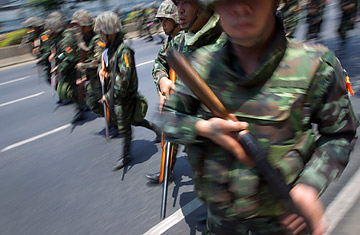
Thai soldiers charge toward antigovernment Red Shirt protesters
Arisman Pongruangrong is a man who inspires fear in many. One of the leaders of Thailand's antigovernment protest movement known as the Red Shirts, he has repeatedly urged his followers to burn down Bangkok. And while speaking from the stage at a Red Shirt protest rally in the Thai capital, he dared police to try to arrest him. Last year, Arisman led a mob that stormed an Asian summit being held at a hotel in Pattaya, sending leaders of China, Japan and other nations fleeing in terror. But on Friday it was Arisman who was afraid.
Wearing a bulletproof vest and tightly surrounded by half a dozen bodyguards, Arisman stared at the rooftops of the buildings around Bangkok's Rajaprasong intersection, where thousands of Red Shirts have been protesting for two months, shutting down the capital's main commercial district. They are demanding that the Prime Minister resign and a new election be called — many are supporters of former Prime Minister Thaksin Shinawatra, ousted in a 2006 coup and currently living in exile rather than serve a prison sentence for a corruption conviction. "There are snipers up there," Arisman said, anxiously scanning the rooftops. "I have to be afraid, but not for myself. I am responsible for all these people," he said, pointing to the protesters, whose ranks once numbered more than 100,000 but now are thinned to fewer than 10,000.
Arisman's fear was hardly without foundation. Less than 24 hours earlier, another Red Shirt leader had been shot in the head and critically wounded by a sniper while talking to reporters on the perimeter of the rally. General Kattiya Sawatdiphol, known as Seh Daeng, was a rogue military officer who had joined the Red Shirt movement and was organizing security at their protest site. He was also accused of being behind dozens of grenade attacks around Bangkok over the past two months — an allegation he strongly denied. Sawatdiphol remains hospitalized in a coma.
The government of Prime Minister Abhisit Vejjajiva has denied responsibility for the shooting. And some in Bangkok have speculated that the assassination attempt was the result of conflicts between the general and other Red Shirt leaders. But thousands of soldiers are surrounding the protest area, and the Red Shirts see snipers everywhere.
"Up there!" shouted a protester, pointing at the tracks of an elevated commuter train running above the protest site. "There are soldiers up there," shouted another, although none were visible. Soon dozens of protesters were pointing skyward. Some began firing homemade rockets at the tracks. The sound of their explosions sent bodyguards scrambling to cover another Red Shirt leader, Jatuporn Prompan, as he was making a speech to the crowd. They quickly hustled him backstage, where a Red Shirt guard stood watch, his rifle wrapped in a white towel.
The surrounding streets were no less tense. Friday, May 14, was a day of skirmishes in Bangkok, with, in the end, 16 killed and nearly 160 injured as soldiers attempted to lay siege to the protest site, hoping that doing so would help them avoid moving in to disperse the protesters by force. Abhisit, whose peace offer to the protesters, which included calling an early election, was rejected, has demanded an end to the sit-in that has cost the country an estimated $2 billion. But the Red Shirts are refusing to leave, and throughout the day they burned buses, threw smoke bombs and fired homemade rockets at soldiers who responded mostly with rubber bullets and tear gas but also live rounds (the other side has guns too).
The soldiers also came under attack from behind after hundreds of slum dwellers from the port neighborhood of Klong Toey spilled onto the streets to fire rockets and slingshots at the troops. Soldiers played Thai country music from a truck's loudspeakers and attempted to calm the street fighters by announcing they had no ill will toward the people. But when the Klong Toey mob kept advancing, the soldiers opened fire with rubber bullets. Hundreds of people turned, ducked and ran in a panic, streaming into side streets. At least three people were injured. One motorcycle taxi driver took a rubber bullet to the jaw. His blood splattered on the tar of Rama IV Road, baking under the hot tropical sun.
The mob soon reassembled, with a lone motorcyclist advancing toward the soldiers and waving a Thai flag. Others began throwing rocks and firecrackers, shouting epithets at the troops. As their anger rose, they began chanting in unison, "Ai hia, Ai hia, Ai hia" — literally translated as "monitor lizard," an epithet sure to start a fight among Thais. The troops, however, kept their cool.
A young soldier from the northeast province of Khon Kaen just shook his head at the mob. The Red Shirt movement has strong support in Khon Kaen, and some of the protesters went to Bangkok from there. Asked what he thought about the possibility of battling against his neighbors, the soldier, who asked that his name not be used, just smiled and looked away. "All this just isn't right," he said. "I don't know what's wrong with my country now."
As darkness fell, M-79 grenades were fired in Pratunam, a working-class neighborhood on the northern perimeter of the protest site. A mob had formed there to confront troops, lighting bonfires in the streets and hurling rocks. It wasn't clear who fired the grenades. But as Bangkok hunkered down for another tense night, wondering when troops would move in to finally disperse the protesters and how many might die when they do, the bonfires kept burning, and the sound of gunshots echoed through the streets.
